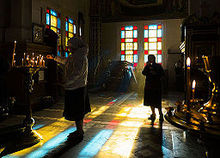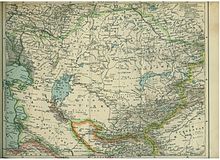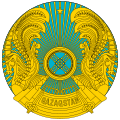| Revision as of 19:53, 27 December 2006 editKazakhPol (talk | contribs)8,391 edits update← Previous edit | Latest revision as of 21:54, 25 September 2024 edit undoVictor EO (talk | contribs)75 editsmNo edit summaryTags: Visual edit Mobile edit Mobile web edit | ||
| (104 intermediate revisions by 92 users not shown) | |||
| Line 1: | Line 1: | ||
| {{Short description|none}} | |||
| '''Christianity in Kazakhstan''' is the second most practiced religion after ], with 46% of the population Christian and 47% Muslim. Most Christian citizens are ], and to a lesser extent ] and ], who belong to the ]. About one-third of the population of Kazakhstan identifies as Christian. 1.5 percent of the population is ], most of whom follow ] or ]. There are also many ]s, ], ], and ].<ref name=REPORT> U.S. Embassy in Astana, Kazakhstan</ref><ref name=SECOND> CIA The World Factbook</ref> | |||
| {{Use dmy dates|date=November 2015}} | |||
| ]. Almaty.]]'''Christianity in ]''' is the second most practiced religion after ] and one of the major religions of ].{{Christianity by country}} | |||
| ==Demographics== | |||
| ], ], and ] have also registered churches with the government.<ref name=REPORT/> | |||
| The 2021 census noted that ] is 69.31% ], 17.19% ], 11.25% other religious beliefs and 2.25% no religious belief.<ref name="2021EthnicStatistics">{{Cite web |url=https://stat.gov.kz/api/getFile/?docId=ESTAT464825 |title=2021 жылғы Қазақстан Республикасы халқының ұлттық санағының қорытындылары |trans-title=Results of the 2021 Population Census of the Republic of Kazakhstan |publisher=Agency of Strategic Planning and Reforms of the Republic of Kazakhstan National Bureau of Statistics |access-date=19 September 2022 |language=Kazakh |archive-date=2 September 2022 |archive-url=https://web.archive.org/web/20220902140633/https://stat.gov.kz/api/getFile/?docId=ESTAT464825 |url-status=dead }}</ref><ref name="2009 Census">{{cite web|url=http://www.stat.kz/news/Pages/n2_12_11_10.aspx|title=Итоги национальной переписи населения 2009 года (Summary of the 2009 national census)|language=ru|publisher=Agency of Statistics of the Republic of Kazakhstan|access-date=15 November 2010|url-status=dead|archive-url=https://web.archive.org/web/20130612063733/http://www.stat.kz/news/Pages/n2_12_11_10.aspx|archive-date=12 June 2013|df=dmy-all}}</ref> | |||
| While 44% of the population is Roman Catholic and only 2% is ], there are more Protestant congregations. 93 "nontraditional" Protestant Christian churches registered with the ] from 2006 to 2007. There are 83 Roman Catholic churches in Kazakhstan.<ref name=REPORT> U.S. Embassy in Astana, Kazakhstan</ref> | |||
| Other figures suggest that 24% of the population is Orthodox, 1% is either Protestant or Catholic and 1% belongs to other Christian denominations.<ref></ref> | |||
| There are two Baptist organizations in Kazakhstan; the Council of Churches of Evangelical Christians and Baptists, with 1,000 members, and the ], with 10,000 members. 198 churches affiliated with the Baptist Union registered with the government.<ref name=REPORT> U.S. Embassy in Astana, Kazakhstan</ref> | |||
| In 2022, the government considered several religions as 'traditional', including ] of Sunni Islam, the ], Greek and Roman Catholicism, ], and Judaism.<ref></ref> | |||
| ⚫ | ==History== | ||
| ] ] created four administrative divisions in Kazakhstan on ] 1999; the ] of ] and the apostolic administrations of ], ] and ]. The Pope made Astana an archdiocese and Almaty a diocese on ] 2003. | |||
| In 2009, the majority of Christian citizens were ], ] and ], who belong to the ] under the ]. About 1.5 percent of the population is ethnically ], most of whom are ] or ]. Other Christian groups included ]s, ], ], ] (]) and ],<ref name=SECOND> CIA The World Factbook</ref> ], ], and ].<ref name=REPORT> U.S. Embassy in Astana, Kazakhstan</ref> | |||
| ==Appointment of Bishop of Atyrau== | |||
| Janusz Kaleta, formerly the apostolic administrator, became the first bishop of Apostolic Administration of Atyrau on ] 2006. Vasiliy Hovera, the Greek Catholics' ecclesiastical superior in Kazakhstan and Central Asia, first spoke during Kaleta's installation ceremony. Tomasz Peta, archbishop of Astana, said "it is necessary to note that so important an event is happening during celebrations for the 15th-year anniversary Kazakhstan's independence. Due to independence and freedom of religion, we now have five bishops." Bishop Henry Theophilus Howaniec of Almaty and Bishop Jerzy Maculewicz, apostolic administrator of Uzbekistan, also attended. Atyrau is the smallest of Kazakhstan's Church jurisdictions.<ref name=BISHOP> Asia News</ref> | |||
| ==Ethnicity in 2009== | |||
| According to the 2009 Census, there were 4,214,232 Christians in Kazakhstan. Their ethnic affiliation is as follows:<ref>{{cite web |url=http://www.stat.kz/p_perepis/Documents/%D0%9D%D0%B0%D1%86%20%D1%81%D0%BE%D1%81%D1%82%D0%B0%D0%B2.rar |title=Archived copy |access-date=2011-07-24 |url-status=dead |archive-url=https://web.archive.org/web/20110723084232/http://www.stat.kz/p_perepis/Documents/%D0%9D%D0%B0%D1%86%20%D1%81%D0%BE%D1%81%D1%82%D0%B0%D0%B2.rar |archive-date=23 July 2011 |df=dmy-all }}</ref> | |||
| *Russians - 3,476,748 (]) | |||
| *Ukrainians - 302,199 (90.7% of Ukrainians) | |||
| *Germans - 145,556 (81.6%) | |||
| *Belarusians - 59,936 (90.2%) | |||
| *Koreans - 49,543 (49.4%) | |||
| *Kazakhs - 39,172 (0.4%) | |||
| *Polish - 30,675 (90.1%) | |||
| *Tatars - 20,913 (10.2%) | |||
| *Azeris - 2,139 (2.5%) | |||
| *Uzbeks - 1,794 (0.4%) | |||
| *Uighurs - 1,142 (0.5%) | |||
| *Chechens - 940 (3.0%) | |||
| *Tajiks - 331 (0.9%) | |||
| *Turkish - 290 (0.3%) | |||
| *Kyrgyz - 206 (0.9%) | |||
| *Kurds - 203 (0.5%) | |||
| *Dungan - 191 (0.4%) | |||
| *Other minorities - 82,254 (52.3%) | |||
| ⚫ | == History == | ||
| {{main|:ru:История христианства в Центральной Азии|Naimans#Religion}} | |||
| ] in eastern Kazakhstan]] | |||
| Before the conquest of ] there used to be a minority of ] in the Kazakh region. A bishop's see existed in the town of ] in the year 334 and Nestorians were in the country when ] arrived in the late 13th century.<ref></ref><ref></ref> | |||
| By the time Kazakhstan was conquered by Genghis Khan, most of the Naimans were Christians. They remained so after the Mongol conquest and were among the second wave of Christians to enter China with ].<ref>Cary-Elwes, Columba. ''China and the Cross''. (New York: P. J. Kennedy and Sons, 1956) p. 37</ref> Meanwhile, the Naimans who settled in the Western Khanates of the Mongol Empire were all eventually converted to Islam. | |||
| A ] monk, ] travelled around Kazakhstan in 1254. He met ] and ] (great-grandson of Genghis Khan); both men converted to Christianity. A few years later ] established the Diocese of Kipciak.<ref></ref> | |||
| Russian Orthodoxy arrived in the country in the 18th and 19th centuries.<ref></ref> | |||
| Incorporation into the ] led to decades of Communist Party controls including confiscation of church property, control of education, and the detention and execution of clergy. | |||
| Political independence in 1991 led to more people taking an interest in religion, as they were now able to read and discuss matters of spirituality; this also led to a rise in the number of citizens identifying as Christians in the 1990s and the early 2000s.<ref></ref> | |||
| ==Converts to Christianity== | |||
| A 2015 study estimates that some 50,000 Christians from a Muslim background reside in the country.<ref>{{cite journal|last1=Johnstone|first1=Patrick|last2=Miller|first2=Duane Alexander|title=Believers in Christ from a Muslim Background: A Global Census|journal=IJRR|date=2015|volume=11|issue=10|pages=1–19|url=https://www.academia.edu/16338087|access-date=30 October 2015}}</ref> | |||
| The Christian mission group ] ranks Kazakhstan as the 47th worst country in the world to be a Christian.<ref></ref> | |||
| ==See also== | |||
| ⚫ | *] | ||
| ⚫ | *] | ||
| ⚫ | *] | ||
| *] | |||
| ==References== | ==References== | ||
| {{reflist}} | {{reflist}} | ||
| == |
==External links== | ||
| * | |||
| *] | |||
| * | |||
| ⚫ | *] | ||
| {{Asia topic|Christianity in}} | |||
| ⚫ | *] | ||
| {{Europe topic|Christianity in}} | |||
| *] | |||
| {{Kazakhstan topics}} | |||
| ⚫ | *] | ||
| {{DEFAULTSORT:Christianity In Kazakhstan}} | |||
| ] | ] | ||
Latest revision as of 21:54, 25 September 2024

Christianity in Kazakhstan is the second most practiced religion after Islam and one of the major religions of Kazakhstan.
Demographics
The 2021 census noted that Kazakhstan is 69.31% Muslim, 17.19% Christian, 11.25% other religious beliefs and 2.25% no religious belief.
Other figures suggest that 24% of the population is Orthodox, 1% is either Protestant or Catholic and 1% belongs to other Christian denominations.
In 2022, the government considered several religions as 'traditional', including Hanafi school of Sunni Islam, the Russian Orthodox Church, Greek and Roman Catholicism, Lutheranism, and Judaism.
In 2009, the majority of Christian citizens were Russians, Ukrainians and Belarusians, who belong to the Eastern Orthodox Church in Kazakhstan under the Moscow Patriarchate. About 1.5 percent of the population is ethnically German, most of whom are Catholic or Lutheran. Other Christian groups included Presbyterians, Jehovah's Witnesses, Seventh-day Adventists, Baptist (Union of Evangelical Christian Baptists of Kazakhstan) and Pentecostals, Methodists, Mennonites, and Mormons.
Ethnicity in 2009
According to the 2009 Census, there were 4,214,232 Christians in Kazakhstan. Their ethnic affiliation is as follows:
- Russians - 3,476,748 (91.6% of the ethnic Russians)
- Ukrainians - 302,199 (90.7% of Ukrainians)
- Germans - 145,556 (81.6%)
- Belarusians - 59,936 (90.2%)
- Koreans - 49,543 (49.4%)
- Kazakhs - 39,172 (0.4%)
- Polish - 30,675 (90.1%)
- Tatars - 20,913 (10.2%)
- Azeris - 2,139 (2.5%)
- Uzbeks - 1,794 (0.4%)
- Uighurs - 1,142 (0.5%)
- Chechens - 940 (3.0%)
- Tajiks - 331 (0.9%)
- Turkish - 290 (0.3%)
- Kyrgyz - 206 (0.9%)
- Kurds - 203 (0.5%)
- Dungan - 191 (0.4%)
- Other minorities - 82,254 (52.3%)
History
Main articles: ru:История христианства в Центральной Азии and Naimans § Religion
Before the conquest of Genghis Khan there used to be a minority of Nestorians in the Kazakh region. A bishop's see existed in the town of Merv in the year 334 and Nestorians were in the country when Marco Polo arrived in the late 13th century.
By the time Kazakhstan was conquered by Genghis Khan, most of the Naimans were Christians. They remained so after the Mongol conquest and were among the second wave of Christians to enter China with Kublai Khan. Meanwhile, the Naimans who settled in the Western Khanates of the Mongol Empire were all eventually converted to Islam.
A Franciscan monk, William of Rubruck travelled around Kazakhstan in 1254. He met Möngke Khan and Sartaq Khan (great-grandson of Genghis Khan); both men converted to Christianity. A few years later Pope Nicholas III established the Diocese of Kipciak.
Russian Orthodoxy arrived in the country in the 18th and 19th centuries.
Incorporation into the Soviet Union led to decades of Communist Party controls including confiscation of church property, control of education, and the detention and execution of clergy. Political independence in 1991 led to more people taking an interest in religion, as they were now able to read and discuss matters of spirituality; this also led to a rise in the number of citizens identifying as Christians in the 1990s and the early 2000s.
Converts to Christianity
A 2015 study estimates that some 50,000 Christians from a Muslim background reside in the country.
The Christian mission group Open Doors ranks Kazakhstan as the 47th worst country in the world to be a Christian.
See also
- Religion in Kazakhstan
- Catholicism in Kazakhstan
- Eastern Orthodoxy in Kazakhstan
- Union of Evangelical Christian Baptists of Kazakhstan
References
- "2021 жылғы Қазақстан Республикасы халқының ұлттық санағының қорытындылары" [Results of the 2021 Population Census of the Republic of Kazakhstan] (in Kazakh). Agency of Strategic Planning and Reforms of the Republic of Kazakhstan National Bureau of Statistics. Archived from the original on 2 September 2022. Retrieved 19 September 2022.
- "Итоги национальной переписи населения 2009 года (Summary of the 2009 national census)" (in Russian). Agency of Statistics of the Republic of Kazakhstan. Archived from the original on 12 June 2013. Retrieved 15 November 2010.
- World Religion Database at the ARDA website, retrieved 2023-08-08
- US State Dept 2022 report
- Kazakhstan CIA The World Factbook
- International Religious Freedom Report 2008 U.S. Embassy in Astana, Kazakhstan
- "Archived copy". Archived from the original on 23 July 2011. Retrieved 24 July 2011.
{{cite web}}: CS1 maint: archived copy as title (link) - EWTN website
- Baptist Theological Seminary website
- Cary-Elwes, Columba. China and the Cross. (New York: P. J. Kennedy and Sons, 1956) p. 37
- EWTN website
- University of Notre Dame website
- Astana Times website, (article dated 22/8/22)
- Johnstone, Patrick; Miller, Duane Alexander (2015). "Believers in Christ from a Muslim Background: A Global Census". IJRR. 11 (10): 1–19. Retrieved 30 October 2015.
- Open Doors website, retrieved 2024-04-14
External links
| Christianity in Europe | |
|---|---|
| Sovereign states |
|
| States with limited recognition | |
| Dependencies and other entities | |
| Kazakhstan articles | ||||||||||
|---|---|---|---|---|---|---|---|---|---|---|
| History |
|  | ||||||||
| Geography |
| |||||||||
| Politics | ||||||||||
| Economy | ||||||||||
| Culture |
| |||||||||
